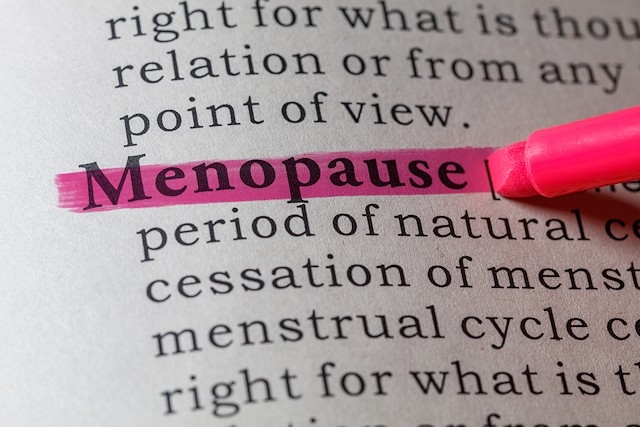Cardiovascular
Rochdale GP speaks out about cardiovascular disease in women for…
Date published: 18 October 2023
Photo: Feng Yu – stock.adobe.com
Menopause
World Menopause Day on 18 October aims to raise awareness of the menopause, associated health issues and the support options available for improving health and wellbeing.
The International Menopause Society has this year chosen to raise awareness of the associated cardiovascular disease risks associated with the menopause.
The menopause itself refers to the 12 months after a woman’s periods have stopped due to lower hormone levels. It usually affects women between the ages of 45 and 55. The perimenopause refers to the time period leading up to the menopause when women begin to display symptoms of lower oestrogen levels, including irregular periods.
The International Menopause Society says: “Breast cancer is often believed to be the number one cause of death and disability in women. In reality, it is cardiovascular disease. The number of cases of cardiovascular disease is high and continuing to rise. But by understanding more about the causes and impacts of cardiovascular disease, you can take steps to reduce your risk.
“More and more women – particularly younger women – have high blood pressure, obesity or diabetes. This is leading to an increase in cardiovascular disease, and we are seeing it in younger as well as older women. The trend is expected to continue. By understanding the different risk factors, you can take steps to reduce your chances of getting cardiovascular disease. And, the sooner you act, the better.”
Cardiovascular disease is an umbrella term which encompasses several disorders, including coronary artery disease, congestive heart failure, and transient ischemic attacks and strokes.
The International Menopause Society says women who go through an early or premature menopause – before 45, or 40, respectively – may be at higher risk of developing cardiovascular disease, adding: “Menopause at the average age of 51 may lead to a heightened risk of developing the disease.
“Unless there is a good reason not to, the use of menopausal hormone therapy, particularly for women with premature and early menopause, is recommended to reduce the risks of heart disease.”
Rochdale GP, Dr Anita Sharma, who is also the founder of a women’s health charity – Endometriosis Charity North West – says raising awareness of the support options available is important as both the menopause and perimenopause can have a “major impact on women’s life including relationship and work.”
She explained: “Diabetes, high blood pressure and obesity are all risk factors of cardiovascular disease. This can lead to angina, heart attack, heart failure and even stroke.
“More and more women, particularly young women, are getting cardiovascular disease, and the trend is expected to continue.
“If menopause happens at a particularly early age, this can speed up the possible development of cardiovascular disease, and more and more women – particularly younger women – have high blood pressure, diabetes or are overweight. This is leading to an increased risk of cardiovascular disease.”

Dr Sharma continued: “A recent study did show that menopausal services in the UK are limited by a lack of specialist staff and a long waiting time. 44% of women waited over one year for menopause care, but this varies from area to area.
“If you are suffering with menopausal symptoms, do not suffer in silence. Speak to a health care professional, detail your symptoms and the impact it is causing on your daily life. The recently published Women’s Health Strategy also mentions that help and support at workplace is one of the priorities.
“Speak with your employer for breaks if you had a sleepless night, and a fan on your desk if you suffer with sweating and hot flushes.”
The International Menopause Society recommends making several positive lifestyle choices to reduce risk of developing cardiovascular disease, including giving up smoking, exercising more, maintaining a healthy weight for your height, developing good sleeping habits and practising mindful eating.
It also advises identifying and treating medical risks linked with blood pressure, blood sugar or blood cholesterol levels, and talking to your GP about your reproductive history
What does the Women’s Health Strategy say about menopause?
The menopause was the third most selected topic picked for inclusion in the Women’s Health Strategy, the UK government’s ambitious 10-year plan to tackle disparities in accessing health services.
It has an end goal of ensuring women across all demographics can access health and care services that are free from stigma and discrimination, whilst improving health outcomes.
For menopause specifically, it aims to raise awareness and ensure it is no longer a taboo subject in society, whilst ensuring women can recognise symptoms and know their options, including self-care and where to seek support, including HRT, and access specialist and personalised support.
It also aims for healthcare professionals to have understanding of the menopause and associated health risks so they can signpost women to appropriate places and offer treatment, and encourage employers to implement evidence-based workplace support for the menopause, including introducing workplace menopause policies.
The Women’s Health Strategy has come about as women spend a significantly greater proportion of their lives in ill health and disability when compared with men, whilst the health and care system has, historically, been designed by men for men.
This has led to gaps in data and evidence about conditions affecting only women, such as menopause or endometriosis, and gaps in how conditions affecting both men and women can impact them in different ways.

